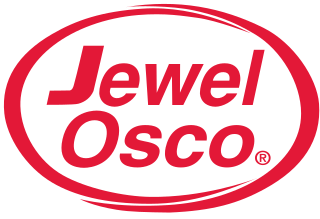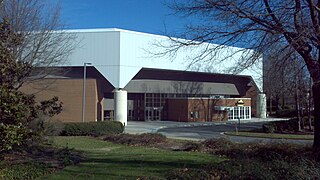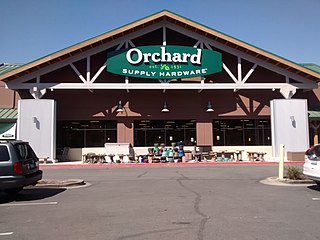
Jewel-Osco is a regional supermarket chain in the Chicago metropolitan area, headquartered in Itasca, a western suburb. In 2007, the company had 188 stores across northern, central, and western Illinois; eastern Iowa; and portions of northwest Indiana. Jewel-Osco has been a wholly owned subsidiary of Boise-based Albertsons since 1999. The company originally started as a door-to-door coffee delivery service before it expanded into delivering non-perishable groceries and later into grocery stores, and supermarkets. Prior to its 1984 acquisition by American Stores, Jewel evolved into a large multi-state holding company that operated several supermarket chains and other non-food retail chain stores located from coast to coast and had operated under several different brand names.

99 Ranch Market is an American supermarket chain owned by Tawa Supermarket Inc., which is based in Buena Park, California. 99 Ranch has 58 stores in the U.S., primarily in California, with other stores in Nevada, Oregon, Washington, New Jersey, Texas, Maryland, Massachusetts, Arizona, and Virginia. The company also started offering shopping via its website in 2014. In February 2021, the company also launched their mobile app for grocery delivery.

Kohl's is an American department store retail chain, operated by Kohl's Corporation. It currently has 1,165 locations, operating stores in every U.S. state except Hawaii. The company was founded by Polish immigrant Maxwell Kohl, who opened a corner grocery store in Milwaukee, Wisconsin, in 1927. It went on to become a successful chain in the local area, and in 1962 the company branched out by opening its first department store. British American Tobacco Company took a controlling interest in the company in 1972 while still managed by the Kohl Family, and in 1979, the corporation was sold to BATUS Inc. A group of investors purchased the company in 1986 from British American Tobacco and took it public in 1992.
Gemco was an American chain of membership department stores that was owned by San Leandro-based Lucky Stores, a California supermarket company which eventually became part of Albertsons. Gemco operated from 1959 until closing in late 1986. A number of the west coast stores leases were sold to Target which fueled their entry into California. Gemco had a version called Memco, also owned by Lucky Stores, that operated stores in the Chicago, Illinois, and Washington, D.C., areas.

Broadway Stores, Inc., was an American retailer based in Southern California. Known through its history as Carter Hawley Hale Stores and Broadway Hale Stores over time, it acquired other retail store chains in regions outside its California home base and became in certain retail sectors a regional and national retailer in the 1970s and 1980s. The company was able to survive takeover attempts in 1984 and 1986, and also a Chapter 11 bankruptcy filing in 1991 by selling off most of its assets until August 1995 when its banks refused to advance enough additional credit in order for the company to be able to pay off suppliers. At that point, the company sold itself to Federated Department Stores for $1.6 billion with the acquisition being completed on October 12, 1995.
Pottery Barn is an American upscale home furnishing store chain and e-commerce company, with retail stores in the United States, Canada, Mexico and Australia. Pottery Barn is a wholly owned subsidiary of Williams-Sonoma, Inc.

EagleBank Arena is a 10,000-seat arena in the eastern United States, on the campus of George Mason University in Fairfax, Virginia, a suburb southwest of Washington, D.C.
CSK Auto, Inc. was a specialty retailer of automotive parts and accessories in the western United States. CSK Auto became a publicly traded company in March 1998, headquartered in Phoenix, Arizona, and grew through a combination of acquisitions and organic growth. It was acquired in 2008 by O'Reilly Automotive.

Brentano's was an American bookstore chain with numerous locations in the United States.

Inova Health System is a not-for-profit health organization based in Falls Church, Virginia, near Washington, D.C. The system is a network of hospitals, outpatient services, assisted living and long-term care facilities, and healthcare centers in the Northern Virginia market.

Lucky Stores was an American supermarket chain founded in San Leandro, California, that operated from 1935 until 1999. The Lucky brand was revived in 2007 and is now operated as two separate and distinct chains by Albertsons in Utah as Lucky and Save Mart Supermarkets in Northern California as Lucky California.

Thrifty PayLess Holdings, Inc. was a pharmacy holding company that owned the Thrifty Drugs and PayLess Drug Stores chains in the western United States. The combined company was formed in April 1994 when Los Angeles–based TCH Corporation, the parent company of Thrifty Corporation and Thrifty Drug Stores, Inc., acquired the Kmart subsidiary PayLess Drug Stores Northwest, Inc. At the time of the merger, TCH Corporation was renamed Thrifty PayLess Holdings, Inc. and Thrifty operated 495 stores, PayLess operated 543 stores.

Giant Food of Maryland, LLC is an American regional supermarket chain with 166 stores located in Delaware, Maryland, Virginia, and the District of Columbia. It is a subsidiary of Ahold Delhaize, and headquartered in unincorporated Prince George's County, Maryland, near Landover.

Home Quarters Warehouse (HQ) was an American chain of "big-box" home improvement stores, originally based in Virginia Beach, Virginia. In 1984, the chemical manufacturing company W.R. Grace & Co. announced its intentions to enter the home improvement retail business, hiring Bernard R. Kossar and Frank Doczi to head the new chain.

Orchard Supply Hardware (OSH) was an American retailer of home improvement and gardening products. Headquartered in San Jose, California, Orchard Supply Hardware had dozens of locations throughout California, with expansions into Oregon and Florida.
Sears Holdings Corporation was an American holding company headquartered in Hoffman Estates, Illinois. It was the parent company of the chain stores Kmart and Sears and was founded after the former purchased the latter in 2005. It was the 20th-largest retailing company in the United States in 2015. It filed for Chapter 11 bankruptcy on October 15, 2018, and sold its assets to ESL Investments in 2019. The new owner moved Sears assets to its newly formed subsidiary Transformco and after that, Sears Holdings Corporation was closed.
Interstate Department Stores, Inc., was an American holding company for a chain of small department stores, founded in Delaware in 1928. After a very rapid expansion as the result of acquisition and expansion of two discount store chains acquired in 1959 and 1960 and also two toy store chains acquired in 1967 and 1969, the firm was renamed in 1970 as Interstate Stores, Inc., to better reflect its business. Increased competition and the changes in consumer buying habits eventually led to decreased sales in the late 1960s and early 1970s which forced the firm to file for bankruptcy in 1974. After shedding all of its non-performing units, the firm was able to exit bankruptcy with the entire toy division intact along with a small remnant of the department store division in 1978. The firm was renamed Toys "R" Us upon emergence from bankruptcy.
Healthy Back, also known as The Healthy Back Store, was a chain of stores centered in Maryland and Virginia that sold products aimed at helping people with back pain or other physical conditions. The company stated on its website www.healthyback.com that it is out of business as of September 20, 2023. The company was founded by Anthony Mazlish in 1994 in Rockville, Maryland after he suffered a back injury and found there was an open niche for a specialty back retailer.












